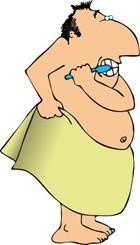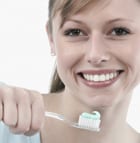 A Leeds dentist was talking about the dropping standards of oral hygiene amongst the patients that he sees in his clinic. The unfortunate part is that most people do not know how badly they are affecting their health by neglecting this aspect of their lives.
A Leeds dentist was talking about the dropping standards of oral hygiene amongst the patients that he sees in his clinic. The unfortunate part is that most people do not know how badly they are affecting their health by neglecting this aspect of their lives.
There is more to oral hygiene than just preventing tooth decay and bad breath. These are certainly two things that can be prevented if you brush your teeth regularly, but lack of oral hygiene can have even worse consequences. At the very least you will have to face bigger dental bills since you will have no option but to go in for procedures such as root canal treatments if your teeth have rotten too much to be saved with a simple filling. Your love life and even profession can suffer as a result of this since people will be put off by your bad breath.
You need to brush your teeth at least twice a day and you also need to keep it clean in between meals at least by rinsing with water. Flossing is also very important, and so is a six month check up with a dentist. Avoid sugary drinks and foods in between meals and never make the mistake of sleeping without cleaning your mouth.
If you do not clean your mouth regularly, plaque will build up, leading to tartar formation which can eventually cause heart disease.
Oral hygiene is very easily done if you are disciplined in your habits. Make these changes before it is too late.





 Every dentist surgery has a dental hygiene nurse; their job is to advise you on the best ways to prevent dental problems. Yet, not many patients actually ask their advice says a Leeds dentist. Oral Hygiene is the most important job we perform each day, if carried out properly then it will keep infections and bad breath away. It will also save us time in the dentist chair and money. There are 24 hours in a day and for the whole of that time out mouths are a hive of activity, most of it working against our teeth. At night our saliva gland sleeps when we sleep, saliva not only helps us swallow food, it also neutralises oral acid that is produced when bad bacteria feeds off fat and sugary debris that is trapped in between our teeth. Throughout the day that bacteria is feeding and producing acid that wears down the enamel on our teeth, so it is important we keep our mouths clean and watered all day and night. Tartar is a by-product of this process and is generally removed when we have our 6 monthly check ups, but in between visits it is eating away at our teeth. Before we brush we need to floss the teeth, this will loosen up the debris and any residue that is left from the night time. Then a vigorous brushing will loosen more, and finally a good rinse will remove the final bits. Throughout the day you can keep acid down by constantly swigging just plain water.
Every dentist surgery has a dental hygiene nurse; their job is to advise you on the best ways to prevent dental problems. Yet, not many patients actually ask their advice says a Leeds dentist. Oral Hygiene is the most important job we perform each day, if carried out properly then it will keep infections and bad breath away. It will also save us time in the dentist chair and money. There are 24 hours in a day and for the whole of that time out mouths are a hive of activity, most of it working against our teeth. At night our saliva gland sleeps when we sleep, saliva not only helps us swallow food, it also neutralises oral acid that is produced when bad bacteria feeds off fat and sugary debris that is trapped in between our teeth. Throughout the day that bacteria is feeding and producing acid that wears down the enamel on our teeth, so it is important we keep our mouths clean and watered all day and night. Tartar is a by-product of this process and is generally removed when we have our 6 monthly check ups, but in between visits it is eating away at our teeth. Before we brush we need to floss the teeth, this will loosen up the debris and any residue that is left from the night time. Then a vigorous brushing will loosen more, and finally a good rinse will remove the final bits. Throughout the day you can keep acid down by constantly swigging just plain water. Bad breath, if you`re lucky can be simply down to odorous foods eaten earlier on, if you`re not so lucky it can be down to a poor dental hygiene regime says a Leeds dentist. Some dental patients are even diagnosed with unrelated diseases that can be a cause of poor breath. If you`re diabetic or suffer from a liver disease then this can be the cause, but for most of us it’s a case of a poor hygiene plan. At every dental surgery there is a dental hygiene nurse, and their job is to give that extra after care to patients, especially in preventative dental matters. Start by consulting them, and in the meantime try these simple, but affective ways of cleaning your teeth and keeping acid and bacteria production down. Flossing is the most understated method of clean teeth that is available; it will loosen up and remove the food debris that causes acid. So, start off the day with a good flossing, get floss that suits you as well, ask the people in the chemist to recommend one. After that, brush your teeth vigorously and don`t forget those nooks and crannies. Then rinse your mouth with a good, not a cheap, mouth rinse, and carry with you a tooth pick and floss stick. Every time you eat something, floss and pick, then rinse with water. This will keep acid at bay, and with it the bacteria that causes bad breath, chewing mints will just temporarily hide the problem. Also drink water throughout the day as this too will help.
Bad breath, if you`re lucky can be simply down to odorous foods eaten earlier on, if you`re not so lucky it can be down to a poor dental hygiene regime says a Leeds dentist. Some dental patients are even diagnosed with unrelated diseases that can be a cause of poor breath. If you`re diabetic or suffer from a liver disease then this can be the cause, but for most of us it’s a case of a poor hygiene plan. At every dental surgery there is a dental hygiene nurse, and their job is to give that extra after care to patients, especially in preventative dental matters. Start by consulting them, and in the meantime try these simple, but affective ways of cleaning your teeth and keeping acid and bacteria production down. Flossing is the most understated method of clean teeth that is available; it will loosen up and remove the food debris that causes acid. So, start off the day with a good flossing, get floss that suits you as well, ask the people in the chemist to recommend one. After that, brush your teeth vigorously and don`t forget those nooks and crannies. Then rinse your mouth with a good, not a cheap, mouth rinse, and carry with you a tooth pick and floss stick. Every time you eat something, floss and pick, then rinse with water. This will keep acid at bay, and with it the bacteria that causes bad breath, chewing mints will just temporarily hide the problem. Also drink water throughout the day as this too will help. The oral health of your child is of very great importance and significance as it can affect the health of their teeth for the rest of their lives. It is our responsibility as parents to ensure that we do all we can to look after the health of our children’s teeth to give them the best possible start in life.
The oral health of your child is of very great importance and significance as it can affect the health of their teeth for the rest of their lives. It is our responsibility as parents to ensure that we do all we can to look after the health of our children’s teeth to give them the best possible start in life. Bad breath can affect all of us at certain times. It can be particularly embarrassing and difficult because it is almost impossible to know if you are suffering from it. This is why so many people are anxious and resort to all sorts of lengths to make sure their breath is fresh. Just search the internet to see how many different cures and secret remedies are available if you part with your hard earned money. There is certainly a lot of money exploiting people’s anxieties and fears.
Bad breath can affect all of us at certain times. It can be particularly embarrassing and difficult because it is almost impossible to know if you are suffering from it. This is why so many people are anxious and resort to all sorts of lengths to make sure their breath is fresh. Just search the internet to see how many different cures and secret remedies are available if you part with your hard earned money. There is certainly a lot of money exploiting people’s anxieties and fears. There are many reasons why dental hygiene is very important. Firstly, the mouth is the gateway to the rest of the body. All food goes in through the mouth and it is also used for breathing. Having an unhygienic mouth can expose your body to many bacteria that can live in the mouth if not properly controlled. It is also true that the smell given off by this bacteria can be carried out of the mouth by breathing giving you the unpleasant condition of bad breath. For these reasons, it is important to keep the mouth as clean and fresh as possible.
There are many reasons why dental hygiene is very important. Firstly, the mouth is the gateway to the rest of the body. All food goes in through the mouth and it is also used for breathing. Having an unhygienic mouth can expose your body to many bacteria that can live in the mouth if not properly controlled. It is also true that the smell given off by this bacteria can be carried out of the mouth by breathing giving you the unpleasant condition of bad breath. For these reasons, it is important to keep the mouth as clean and fresh as possible. Taking good care of your teeth is very important. If you look after your teeth well, they will last you a lifetime but the consequences of ignoring dental hygiene can result in pain, expensive treatment and embarrassing dental conditions. From an early age we are all taught how to clean our teeth and the very good reasons for doing so, but often as people get older they become complacent or forget to look after their teeth as well as they can. Leeds dentists are urging all patients to care more for their teeth and can offer tips at check up appointments, as well as looking for any signs of decay.
Taking good care of your teeth is very important. If you look after your teeth well, they will last you a lifetime but the consequences of ignoring dental hygiene can result in pain, expensive treatment and embarrassing dental conditions. From an early age we are all taught how to clean our teeth and the very good reasons for doing so, but often as people get older they become complacent or forget to look after their teeth as well as they can. Leeds dentists are urging all patients to care more for their teeth and can offer tips at check up appointments, as well as looking for any signs of decay. The clean feeling you get after you have been to the dentist is hard to beat and almost impossible to recreate at home, no matter how hard you try to clean your teeth. That is because dentists are experts and able to use special tools and techniques to get your teeth as clean as they can possibly be. This will almost always involve techniques called scaling and polishing.
The clean feeling you get after you have been to the dentist is hard to beat and almost impossible to recreate at home, no matter how hard you try to clean your teeth. That is because dentists are experts and able to use special tools and techniques to get your teeth as clean as they can possibly be. This will almost always involve techniques called scaling and polishing. The oral cavity can be an indicator of overall health. Many diseases that affect the body are first visibly noticed by an examination of the mouth. This explains why doctors always examine your tongue during check ups and when looking to make a diagnosis. But it can also work the other way round. Your overall health can be affected by the health of your mouth.
The oral cavity can be an indicator of overall health. Many diseases that affect the body are first visibly noticed by an examination of the mouth. This explains why doctors always examine your tongue during check ups and when looking to make a diagnosis. But it can also work the other way round. Your overall health can be affected by the health of your mouth. Central Leeds dentists are always stressing the importance of flossing to all patients at dental check ups. This is because despite all the evidence that points to the benefits of flossing, there is still only a relatively small percentage of people who actually do it. Nearly everyone brushes their teeth, but many people are perhaps wrongly convinced that this enough.
Central Leeds dentists are always stressing the importance of flossing to all patients at dental check ups. This is because despite all the evidence that points to the benefits of flossing, there is still only a relatively small percentage of people who actually do it. Nearly everyone brushes their teeth, but many people are perhaps wrongly convinced that this enough.

